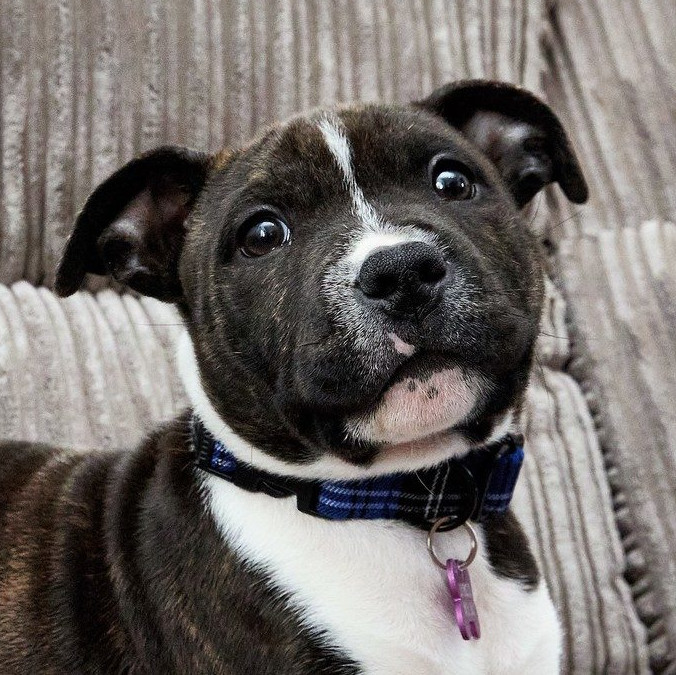
Questions to ask when buying a puppy
Asking the right questions can be the best way to avoid the risks of the illegal puppy trade
The following questions can help you to ensure you do not get tricked. A responsible breeder will be happy to answer them and will provide you with information on how to care for the puppy.
Questions about the puppy
Who is the mother dog? Who is the father dog? Can I meet them and the puppies before deciding to buy one?
A responsible breeder should provide you with details about both parents of the litter. If the parents are registered with the Kennel Club, you can look up the parents' details and all recorded health test details available. It is a legal requirement for the mother dog to be there when you go to meet the puppies. It is also important to pay attention to how the mother dog reacts to the puppies whilst you are there. Does the apparent mother dog’s breed match that of the puppies you are going to meet? Does she seem interested in the puppies whilst you interact with them? How does she behave around the puppies, and how do the puppies react to her if you step away? Some unscrupulous puppy sellers will use fake mothers alongside puppies that may have come from third parties. Fake mother dogs may not show any interest in the puppies, they might not even be the same type of dog. Even mothers of puppies of eight weeks old will show signs of having been pregnant such as slightly swollen belly and enlarged nipples. A dog that does not show any signs of having been pregnant should be a clear indicator that the seller is not being truthful and should be avoided.
Many breeders opt to use a stud dog, meaning that the father of the puppies might not live with the breeder. A responsible breeder should be able to give you all the relevant information about what stud dog was used, including Kennel Club name (if registered) and any available health test records.
How old is the puppy? When were they born?
It is illegal to buy a puppy younger than eight weeks old. A responsible breeder should know the date of birth of their puppies, as well as be able to tell you how old they are. If you have found a litter of puppies via an online advert, make sure the date of birth or age of the puppy matches what is advertised. Do not be afraid to compare pictures of your chosen puppy with others of the same breed and age to make sure they look similar. There are some characteristics that can help you tell how old a puppy might be. For example, newborn puppies do not open their eyes until they are 10 – 14 days old. Puppy behaviour and eating preferences are also a good indicator of age. Watch how your puppy moves around, or what food they are eating. Younger puppies may be a bit wobblier on their paws as they learn to navigate the world. Puppies start to wean from their mothers as early as three weeks old as their teeth start to grow through and they can manage solid food. By eight weeks old (the earliest you can legally purchase a puppy), they should be completely weaned and on a diet of solid food. Any signs of a puppy still trying to nurse from its mother could be an indication that they are not old enough to be sold.
When can I take the puppy home?
Legally, puppies must be at least eight weeks old when sold. Some breeders may opt to hold onto their puppies until they are up to 12 weeks old. Any breeder offering to let you take a puppy home that is younger than eight weeks old should be avoided and are breaking the law.
Is the puppy microchipped?
Under UK law, all puppies must be microchipped by their breeder once they reach eight weeks old. It is a breeder's responsibility to ensure puppies are microchipped prior to selling them. Microchips must be initially registered to the breeder before you can bring your puppy home. Buying a puppy that is not microchipped and registered to the breeder’s name is illegal. When you complete the purchase of your puppy, your breeder should provide you with your puppy’s microchip, along with details on how to transfer the details of the microchip from the breeder to you. Once you buy the puppy, it’s your legal responsibility to update the microchip from the breeder’s details to yours.
Does the puppy have a pet passport?
For puppies born and raised in the UK, it is not a legal requirement for them to have a pet passport prior to being sold, providing they are to stay within the UK. If a puppy is advertised as coming with a pet passport, this is an indication that they may have been imported into the country. There are several things a puppy will come with if it has been imported into the UK including: a pet passport, a certificate proving it has received a rabies vaccination in its country of origin, and an Animal Health Certificate that can only be issued by a vet. For further information on the legal requirements for importing a puppy to the UK, please visit the UK Government website here.
Will a contract be signed for the purchase of the puppy?
A responsible breeder should be more than happy to issue you with a contract pending the sale of one of their puppies. A contract, whether written by the breeder or obtained via a third-party provider, should contain information about the puppy and both yours and the breeder's details. It should also contain details of warranty or health claims made by the breeder and any responsibilities or agreements you make to them, such as when the puppy shall be neutered or spayed, or what agreement is in place if you find yourself no longer able to look after the puppy. A breeder who does not provide you with a contract, or one that refuses to sign even the basics of agreements with you surrounding the purchase of your puppy should be avoided.
Can I see the puppy’s documents prior to the purchase?
A responsible breeder will be more than happy to show you all the relevant documents relating to your puppy before the purchase. This includes a health certificate from a registered vet, proof of microchip and a pedigree certificate if the puppy is registered with the Kennel Club. If they are selling the puppy without any form of documents, it is advised to walk away from the purchase.
Is the puppy healthy?
It is essential to check this with the breeder and to have their statement in writing, for example in the contract, that the puppy is healthy. Upon purchase, a responsible breeder should give you a health certificate from a vet, stating that as best to their knowledge the puppy is deemed healthy, or in some instances a vet might highlight potential issues with a puppy such as signs of a heart murmur. If you would like to make sure your puppy’s health certificate is valid, the certificate should have contact information for which veterinary clinic was used so you can follow up with any concerns about authenticity.
What vaccinations does the puppy have?
It is important to note that not every breeder will vaccinate their puppies before you bring them home. A responsible breeder that opts to not vaccinate their puppies prior to sale should advise you on what vaccinations your puppy should have and when. Typically, puppies are vaccinated at around eight weeks old (but can be vaccinated as young as six weeks old) and then will require a second vaccination between two and four weeks later. Different vets use different brands of vaccination, so it is always best to speak with a vet about this before starting a course of vaccinations on a puppy to ensure they are vaccinated correctly. Vaccinations are recommended for the following diseases: canine distemper, canine parvovirus, leptospirosis, parainfluenza and kennel cough.
Has the puppy had any worming treatment?
A responsible breeder will deworm their puppies every two weeks, but do not rely solely on words. You can request relevant medical information about the puppy and a responsible breeder should be happy to provide this for you. A breeder that cannot tell you when or what their puppies were wormed with should be avoided.
When you bring your puppy home, a responsible breeder may recommend what worming treatment can be used so that you can continue to keep your puppy worm-free once home.
Have the parents been tested for common diseases of the breed?
A responsible breeder should be willing to make sure any dogs that they are breeding from have had all the necessary tests and checks done prior to breeding. Different breeds are predisposed to different conditions so there are no blanket health test requirements. Most puppies cannot be fully health tested at just eight weeks old prior to sale, but their parents should be.
Health testing in different breeds
Your breeder should be more than happy to talk you through the common health conditions of their breed, and what health tests their dogs have had. Examples of breeds and common health conditions and the relevant tests they should have done prior to breeding (all should include DNA testing) include:

Labrador Retriever

Poodle (all sizes)

French Bulldog

German Shepherd

Staffordshire Bull Terrier

Chihuahua

Pug

Dachshund (miniature and standard sizes)
Know the scores
What is a DNA test?
A DNA test will help to screen a dog to see whether they carry any of the genes responsible for any genetic diseases or conditions that can be passed down to any offspring, as well as highlighting whether the dog is more likely or not to show symptoms of any of the genetic diseases or conditions they carry. Examples of conditions covered in DNA tests include: centronuclear myopathy, progressive retinal atrophy, skeletal dysplasia.
What is a heart score?
Some puppies may be advertised that they come from “heart scored parents”. This means that both parents will have their hearts scanned, assessed and scored by a veterinary specialist based on the size of their hearts. Different breeds have different requirements for their scores, so once you have settled on a breed of dog, be sure to do your homework into this as to whether your breed is recommended to have this test done. The higher the heart score compared to the breed average, the higher the indication that there may be some underlying heart conditions carried by the parents.
What is a hip or elbow score?
A hip or elbow score is the ranking given based on the condition of a dog's elbow and hip joints. It involves x-raying the hips and/or elbows, of certain breeds such as labradors, German shepherds or poodles which are known to be genetically susceptible to hip and or elbow dysplasia.
The lower the score, the better the conformation of the hip and elbow. The current British Veterinary Association (BVA) advice is to only breed from dogs with a hip score of below the breed average and to only breed from a dog with a zero elbow score. For more information on this, please visit the BVA website here.

Questions about the breeder
Are you the breeder of these puppies?
It is important to know where the puppy comes from. In the UK, it is a legal requirement for puppies to be sold by the person who bred them, and they must also be shown to you in the house they were bred in. If they offer to drive them to you, or meet in a public place, this is illegal and is a sign of an illegal breeder.
Are you registered as a breeder? Do you have a registration number?
There is a difference between being Kennel Club Registered and being a licenced breeder. A licence is a legal requirement for anyone running a dog breeding business, including having three or more litters within a 12-month period and selling any of these puppies. Licences are valid for up to three years and are subject to inspection via the local council. If licenced, a breeder must advertise their licence number along with any adverts for puppies. If you are not sure about the legitimacy of a breeder’s licence, you can enquire with the local council who will be able to give you more information. A fully licenced breeder should have no issue with providing you with their licence details. It must be noted that not every breeder will have a licence if they are breeding less than three litters a year. Be sure to do your research to make sure the breeder is legitimate.
Are you registered with the Kennel Club?
Anyone claiming to be a Kennel Club breeder would need to be registered with the official Kennel Club. If so, you can enquire about the legitimacy of the breeder through the Kennel Club by searching for their kennel affix.
How many litters do you have in a year? How many litters has the mother of the puppy had until now?
A responsible breeder should have no issue with letting you know about previous litters and their plans for the next year. Under the UK Kennel Club guidelines for registered breeders, a mother dog should only have four litters in her lifetime, not before 12 months of age, and not after 8 years of age.
Do you offer other breeds of puppies? Do you have puppies of other colours or ages?
A responsible breeder wouldn’t typically have a whole array of different breeds in their household. Some breeders may have one or two breeds. The more breeds available could indicate an illegal puppy seller that only cares about profit. Be wary of any breeder offering multiple puppies of different breeds at one time that conveniently seem available at any time; this often means that they are sourcing puppies from elsewhere to sell, including puppies that may have come from puppy farms or illegally imported.
Do you show your dogs or do any other activities with them?
Breeders will often do more with their dogs than just breeding them. Some breeders will compete with their dogs in shows, agility or other breed specific activities. A breeder that is passionate about their breed should be more than willing to talk you through the various activities you and your dog could take part in, as well as tell you about what they get up to with their dogs, including any awards or titles their dogs might have.
Research into what your chosen breed’s “job” is and see what activities are out there for you to get involved with, even before you bring your puppy home. Being active in these communities is also a good networking opportunity to see what breeders are out there and which may be suitable for you.

Things to be wary of in online adverts
The breeder suggests meeting in a public place
Although it may sometimes feel safer to meet in a park or coffee shop, this tactic means the seller’s true location can never be known and the puppy’s true background is obscured. It is a legal requirement for the sale to take place on the premises in which the puppy is bred, and must be seen interacting with its mother before the sale is finalised.
Offering to drive the puppy to you
Some sellers seem too keen for a quick and easy sale, offering to deliver the puppy direct to the buyer. Responsible sellers will not make this offer. Home deliveries create uncertainty regarding the origin of puppies and is yet another breach of the law, which requires sellers to show puppies interacting with their mother in their place of birth.
Paid advertising memberships
Paid membership accounts used by sellers on classified ad sites give their adverts greater prominence on the site and can increase the sense of legitimacy, but this does not mean they are a responsible breeder. There is virtually no verification of sellers when advertising online, and it allows illegal sellers and breeders to be practically untraceable.
No photographs of the puppies with their mother
Sellers may provide photos of the parents rather than of the puppies with the parents – a strong indicator of illicit sales. Repeat images of previous litters are also often used and some photos provided in adverts can clearly be identified as having been taken abroad, due to the distinct architecture in the background.
Last minute change of location
Puppies being sold from a location different from the one stated in the advert indicates suspicious activity. Illegal puppy sellers can change the viewing location, reducing their transparency and traceability and obscuring the puppy's background.
No documentation
Prolific sellers from other countries may state that the puppies had a ‘full health check’ before leaving their country of origin, claiming that travel would not be possible without such measures, but often do not provide any documentation to prove this. Many puppies are sold without having UK veterinary checks before being advertised, and therefore the health status of the puppies remains unknown at sale.
Different names and numbers
Illegal sellers often use different names and phone numbers to advertise their puppies over consecutive weeks, to appear as if they were different individuals. This can suggest they are breeding on an industrial scale. The lack of transparency makes tracing the origin of puppies almost impossible.
Imported puppies advertised in advance of their arrival in UK
Sellers of imported puppies will advertise puppies before they have arrived in the UK, enabling them to list the puppies and show photos of them from a younger age. This may appeal to a buyers’ preference for a younger puppy and means that the usual listed age of an imported puppy (16–22 weeks) is avoided. The sellers may advise that the puppies can be collected as soon as they arrive in the UK. This would mean that unsuspecting buyers could pick up a puppy straight after a lengthy journey from Eastern Europe, with the animal having received no health care or veterinary checks.

Those looking to purchase a puppy must educate themselves on the myriad of tricks that unscrupulous breeders use to lull potential buyers into a false sense of security. Buyers must also ask for proof of documentation and ensure they see the puppy with its mother and littermates, making sure they question disconcerting behaviour such as wanting to meet in a public place rather than at the seller’s home. You can read more on the tricks of dodgy breeders in our report.
To summarise...
- It is your responsibility to do your research and ask potential breeders questions that may have an impact on the health and lifespan of your new furry friend.
- A responsible breeder should ask you just as many questions as you ask them about who you are, your lifestyle and why you are interested in a puppy from them. Do not let these questions put you off. A responsible breeder will want to vet all potential homes of their puppies just as much as you want to vet potential breeders for their puppies.
- Make sure you know the warning signs of a dodgy breeder and avoid falling into their traps. Countless families have their hearts broken with puppies dying prematurely due to lack of care from illegal breeders.
- Responsible breeders should want to ensure their puppies have homes for life and should be willing to stay in contact with you throughout their puppies' lifetimes. A responsible breeder will always be the first point of call should your circumstances change, and you can no longer look after the puppy. They will always prefer to take any puppies or dogs they have bred back into their care where appropriate at any stage of the animal’s life. If for whatever reason they cannot take the dog back into their care, they will be able to support you in the steps you can take regarding rehoming.
